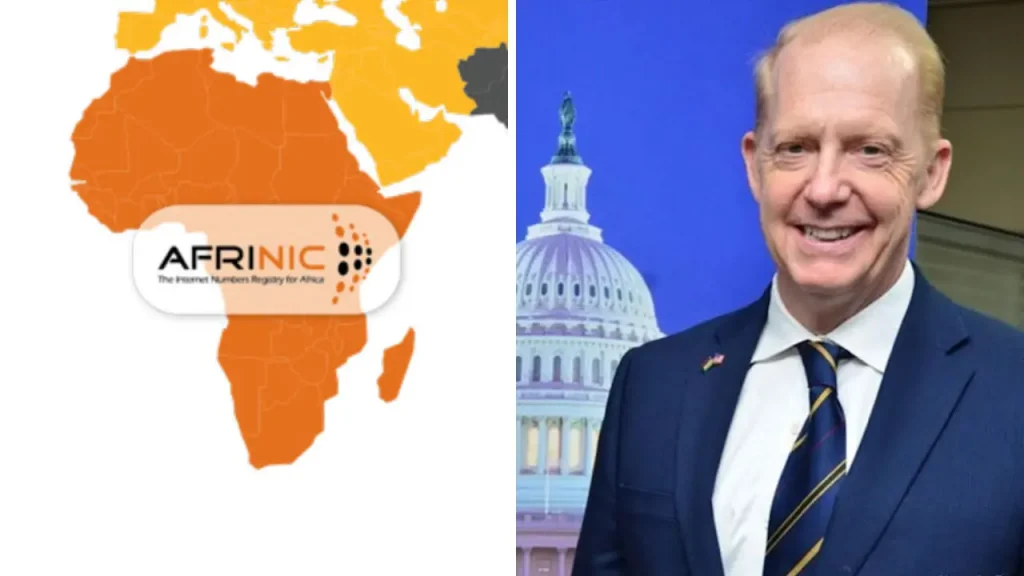- U.S. envoy Henry Jardine backs Mauritius’ AFRINIC intervention; critics argue it violates the Companies Act and undermines democratic member control.
- Bizweek article’s framing of “independence” ignores that true sovereignty means African-led, member-driven governance free from political interference.
Recent statements by U.S. Ambassador Henry Jardine, published in Bizweek, have raised concerns about how ‘independence’ and ‘democracy’ are considered in the internet governance ecosystem. Ambassador Jardine, in the short interview, called for transparency and stated a desire to see AFRINIC retained in Mauritius . But his remarks support actions by the Mauritian government that are inconsistent with democratic governance and the rule of law.
AFRINIC is a membership-based organization, incorporated under Mauritian law. It is not an arm of government. Its authority comes from the agreement of its membership, based across Africa, and not from politicians or state officials. Under Mauritius’ own Companies Act, AFRINIC’s board elections and governance principles must follow its bylaws and the democratic decisions of its membership – not instructions handed down by the state.
Also read: Judge Bellepeau resigns from AFRINIC investigation after injunction
Yet that is precisely what has occurred. AFRINIC’s June 2025 board elections were annulled by the court-appointed receiver under instruction from the government. This directly undermined AFRINIC’s independence and violated both the letter and spirit of Mauritian constitutional law.
For the U.S. ambassador to applaud or justify such intervention as an effort to “preserve the integrity” of AFRINIC is troubling. Independence does not mean that a government can override the will of AFRINIC’s members. Independence means self-governance, under lawful corporate procedures, free from political manipulation. Calling unconstitutional interference “independence” is not only hypocritical—it sets a dangerous precedent for Internet governance globally.
Rule of law vs. politics
The key issue here is the rule of law. AFRINIC is bound by the Mauritius Companies Act, which provides clear frameworks for how elections are conducted and disputes resolved. Nowhere does it allow a government ministry or political actor to dictate who can sit on AFRINIC’s board or to annul lawful election outcomes. The government’s instruction to overturn the June election is therefore unconstitutional, undermining Mauritius’ own legal system.
If one government can simply capture the board of a nonprofit registry by overturning member elections, what prevents other governments from doing the same? This precedent is dangerous: it politicizes Internet governance and threatens the neutrality of Africa’s regional Internet infrastructure.
Also read: AFRINIC Crisis: ICANN and Cloud Innovation in power struggles
Selective concern and hypocrisy
Ambassador Jardine emphasizes transparency and democracy, yet the facts suggest that the U.S. is selectively applying these values. Calling for democracy while backing an unconstitutional state intervention into a private nonprofit’s elections is contradictory. AFRINIC members voted in June; the results were clear. The subsequent annulment did not come from a member-driven dispute-resolution process. It came from political pressure.
True transparency means respecting open elections and the democratic decisions of members. It does not mean applauding a government stepping in to change results after the fact. If such actions happened in another part of the world—with a government annulling elections at a nonprofit—there would be global outcry. Africa deserves the same respect for rule of law and member sovereignty.
Also read: AFRINIC Receiver Gowtamsingh Dabee: Stretching beyond court orders?
Appealing to African sovereignty
AFRINIC exists to serve Africa’s Internet community. Its members – service providers, organizations, and stakeholders across the continent – entrusted its governance to an elected board. It is not meant to be a political pawn. The push to label government interference as “preserving independence” undermines the very sovereignty of African Internet governance.
African stakeholders are fully capable of governing AFRINIC without outside political influence. The June 2025 elections were a transparent expression of member will. To discard those results under government instruction is an affront to that sovereignty. Outside powers should not be encouraging such interference; instead, they should be defending the principle that Africa’s Internet resources are governed by Africans, through their lawful, member-driven processes.
Also read: Smart Africa leaks thousands of AFRINIC member email addresses
Restore rule of law and respect elections
If AFRINIC’s independence is to be upheld, the solution requires a few simple conditions:
- Recognize and uphold the results of the June 2025 elections.
- Stop unconstitutional interference by the Mauritian government or any other political actor.
- Ensure AFRINIC continues to operate under its bylaws and the Mauritius Companies Act—not arbitrary state orders.
- Reaffirm that AFRINIC is a membership-based nonprofit, not a government agency.
The real threat to AFRINIC’s independence is not a lack of government oversight; it is government capture. Once a single government can dictate AFRINIC’s board composition, others will be tempted to follow. This is a continental issue, and ultimately a global one. The Internet’s governance model relies on neutrality and community self-rule. Adding politics to the mix, especially errant and unsophistcated politics, is a danger.
The U.S. and other international partners should reflect on whether backing unconstitutional interventions is in line with their supposed commitments to democracy and transparency. AFRINIC’s members deserve respect for their votes. And Mauritius, which has long been regarded as a rule-of-law jurisdiction, should live up to its own legal principles.
Independence is not achieved through state capture. It is achieved when lawful, democratic processes are respected. For the sake of Africa’s Internet future, it is time to restore the rule of law, end political interference, and defend AFRINIC’s true independence, governed by its members, for its members, serving all Africans.
BTW Media has requested comment from Ambassador Jardine.

